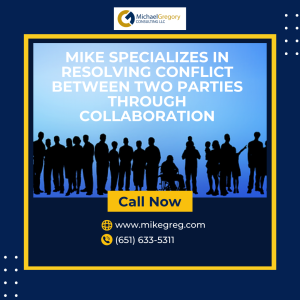When a conflict situation arises between both parties, it is in everyone’s best interest to reach a peaceful resolution. It is important to consider negotiation strategies for an effective conflict resolution process. Read on. This post provides proven negotiation and conflict resolution strategies to address your dispute situations.
When a dispute arises, conflict resolution is necessary. But the outcome can be sadly predictable – the conflict escalates with both sides blaming each other in increasingly strident ways. Often parties can become entrenched, and the dispute can end up in litigation that may further damage the relationship forever.
It is important to consider some effective negotiation and conflict resolution strategies that can help in mending the situation, avoiding lawsuit expenses, and creating value. It is wise to avoid being provoked into responding emotionally. Often negotiators make moves to question the legitimacy of parties and assert their own position. They follow a process known as shadow negotiation that takes place under the surface and helps in explaining why discussing concretely, seemingly irrational issues can result in angry outbursts, simmering conflicts, and hurt feelings. The other party may attempt to provoke you emotionally by challenging, demeaning, and criticizing you which will allow them to have the power balance in their favor. So, how do you avoid being provoked into responding emotionally?
It is better to interrupt their move by taking a break. This way, you will have time to control your emotions and avoid the momentum that goes against you. You should name their move so that they know that you recognize it as a power play. For example, if your coworker says, you can’t be serious! You may answer that “Actually, I’m very serious. Instead of cutting me off, how about you give me a chance to clarify my ideas?” You should make the correct move by flipping the negative remarks of the opposite side with a more positive interpretation. If your coworker blames you improperly for a decision that went wrong, you should focus on the problem, and the facts, and explore what we can do together going forward. Don’t blame anyone. Divert their move by taking their focus back to the issue at hand. If the person criticizes you as an over-sensitive individual, you can say “I think it would be best if we don’t focus on personal judgments; instead we just concentrate on the proposal”.
It is better to consider value-creating strategies
Most negotiators who know the significance of collaboration to create value often overlook that approach during conflict resolution. It is better to treat disputes as different from other deal-making processes that may be thought of as a zero-sum game. Hence, you need to find the same set of value-creating strategies in disputes like the way you do in deals. For example, you need to focus on shared interests or noncompetitive similarities. If both parties would likely suffer from a damaging reputation if the dispute went public, they may want to keep certain aspects of the conflict resolution process confidential. It is suggested that you work together to reach an agreement on seemingly peripheral problems. This may help both parties build a foundation of trust and optimism enabling them to collaborate to resolve main conflict issues.
It is a good idea to use your time to your advantage
The perceptions of both parties about the dispute resolution process may change with time. Rather than thinking of your dispute as permanently intractable, you need to consider it as being constantly in flux. It helps to stay in contact with the other party during the conflict process. Doing so may allow you to motivate them that your current approaches to conflict resolution are not working. When both parties understand the significance of regular meetings, they may be able to work through their differences slowly. Time can be your friend in dispute resolution. When the troublesome party on one side of the conflict or the other departs, it can give new hope for resolution after some time has passed.
Having conducted mediations in person and during Covid virtually, one of the underlying benefits identified by attorneys is that multiple shorter-duration meetings over a longer period of time often result in better outcomes for both parties than having one in-person mediation. The in-person mediation maybe half a day to a full day. The virtual mediation may last several months with several 90-minute sessions. This has been found to be an unexpected positive related to conflict resolution.
Bottom Line –
You should take advantage of such changes by making a new proposal for settlement and working through a mediator to help you with negotiation and conflict resolution.
Author Information –
This article is written by Michael Gregory, a qualified mediator with the Minnesota Supreme Court and an expert in negotiation and conflict resolution.








